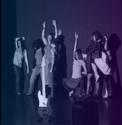Call for Proposals: Performance Research Journal ‘On Ageing (& Beyond)'

Performance Research
Vol. 23, No. 7: ‘On Ageing (& Beyond)' (November 2018)
Issue Editors: Nanako Nakajima and Richard Gough
Proposal deadline: 14 January 2018
When people below 75 years of age are considered as junior citizens worldwide, the world will become rejuvenated and infantilized. What would you do if you found yourself surrounded by children as a result of a proliferation in infantilized citizens, which may perhaps even include you?
This issue welcomes creative ideas regarding ageing in the field of performing arts and at the level of discourse that considers ‘ageing’ as being performative. Through reflexive writing and artist pages this issue will evidence performance work that embraces age and ageing (made by or with ‘senior’ artists) and speculate on the future of ageing bodies and ageing minds (wisdom, experience, frailty and forgetfulness) within creative endeavour and fragile ecologies: it will illuminate alternative, private as well as global temporalities.
A consequence of ongoing medical advancement is that the proportion of elderly people has drastically increased in many societies, and ageing has become an issue of increasing concern. While the taboo of ageing still dominates in many European and American cultural contexts, the seniors are honourable in many Asian contexts. Japan, with 27 per cent of the population more than 65 years old, is especially facing this issue, in that reaching a higher age is historically celebrated and socially taxing in the society. While the seniority system is integrated into social discipline, the pension system puts pressure on national budgets and the younger family members frequently have to take the burden for the nursing of the aged.
Age itself is a changing and performative variable. The twenty-first century is rejuvenating the biological and physical age, along with the social age, which is culturally bound. Bio-technology has developed to such an extent that it is now possible to create a new post-human who has control over birth and death as well as the process of ageing. From the queer perspective, according to Judith Halberstam, the idea of adulthood and maturity is re-examined (In a Queer Time and Place: Transgender bodies, subcultural lives, New York: New York University Press, 2005, p. 2) in terms of temporalities, when one rethinks the conventional adult/youth binary in relation to an epistemology of youth. The manner of calculating age differs from place to place; for example, year calculation was replaced by birthday calculation and the Chinese calendar was replaced by the Gregorian calendar in the process of modernization in Asia. Then, what makes a body age in our globalized temporalities?
The discourse on ageing is also related to the past. While trauma and post-memory studies have developed to be intergenerational, collective memory loss is observed in the political chaos of the United States and in Japan after the Fukushima Daiichi nuclear disaster. Following the remapping of European countries due to the influx of refugees, Europe has become much younger in terms of the statistic median age because of younger immigrants. In fact, the colonial past, characterized by domination over younger countries, is not so far from modern anxiety inscribed in many ageing countries. Are we now looking at a rejuvenating future of the ageing society?
The 2017 official guideline by the Japan Geriatrics Society proposed that the age of a senior citizen should be raised from 65 to 75, because people aged from 65 to 74 are physically and mentally much younger than their counterparts were decades ago. While this guideline aims to support Japan’s super-ageing society for developing a vibrant future, it would also have influence in raising the applicable age of retirement as well as pension and health insurance, by suggesting the bio-political manner in which the concept of age is modifiable.
Age illuminates the human body as its own medium. Therefore, ageing affects dancers’ bodies in far more profound ways than any other kind of artist. Recent discussions on the topic include ageing in performance as an initiative by artists in postmodern dance and performance art who explore the new approach of creating art and still continue their artistic activities in light of performing bodies. Even though these artists are ageing, they continue to pursue art. Thus, how they preserve their ephemeral works in historical collections is a critical matter. Yvonne Rainer returned to dance after her stint in film making. Marina Abramović continues performing and questioning the manner of archiving and reconstructing performance art histories.
We welcome responses to this theme (from the young and the old), which may focus on the innovative, yet (50, 60 or 70-year life-long experienced) informed/wise practices of specific artists, through to provocations about future possibilities and technological developments (and further life extension). Potential topics include (but are not restricted to):
- Critical analysis of, or an artistic approach toward, the alternative concept of timing and linear temporality, proposing beyond, and out of, time. Or in terms of temporality inside and outside of the body, age and maturity perceived and observed in a certain condition, to be adult or child in a certain social and religious situation, on low theory and queer time proposed by J. Halberstam.
- Critical texts and artistic works on anti- and pro-ageing and the aesthetics behind them: faking age, people ageing as a historical archive and memory, recent robotics and post-humanism in terms of ageing, one’s familial responsibility dictating gender roles and age roles, Miwa Yanagi’s works concerning age.
- Documentation, critical appraisal and celebration of performance projects that place ‘elderly’ participants (actors/singers/dancers) at their centre. For example, Pina Bausch’s Kontakhof - with Ladies and Gentlemen over ‘65’, the Saitama Gold Theater consisting of members aged from 62 to 87, The Young @ Heart Chorus, Massachusetts, United States (minimum age 73) who stage ‘rock’ concerts and tour the world. Or, as an example from the United Kingdom, News from the Future,a Cardiff-based group (minimum age 60) of experimental performance makers, who in their full team of twenty members can claim more than 800 years of innovative performance practice.
- Critically engaged analysis of ‘senior’ performance makers, such as Yvonne Rainer, Marina Abramović, Carolee Schneemann, Simone Forti and Anna Halprin, and of internationally renowned theatre directors with sixty or seventy years’ experience, for example, Eugenio Barba, Peter Brook, Robert Wilson, Ariane Mnouchkine and Yukio Ninagawa. And performance makers who remained active for many decades until their death, for example, Kazuo Ohno (dancing until 101), Ruth St. Denis and Merce Cunningham.
Schedule:
Proposals: 14 January 2018
First drafts: April 2018
Final drafts: June 2018
Publication: November 2018
All proposals, submissions and general enquiries should be sent direct to the PR office: info@performance-research.org
Issue-related enquiries should be directed to the issue editors:
Nanako Nakajima (nananakajima@gmail.com)
Richard Gough (cprgough@gmail.com)
General Guidelines for Submissions:
- Before submitting a proposal, we encourage you to visit our website (www.performance-research.org ) and familiarize yourself with the journal.
- Proposals will be accepted by e-mail (Microsoft Word or Rich Text Format (RTF)). Proposals should not exceed one A4 side.
- Please include your surname in the file name of the document you send.
- Please include the issue title and issue number in the subject line of your email.
- Submission of images and visual material is welcome provided that all attachments do not exceed 5 MB, and there is a maximum of five images.
- Submission of a proposal will be taken to imply that it presents original, unpublished work not under consideration for publication elsewhere.
- If your proposal is accepted, you will be invited to submit an article in first draft by the deadline indicated above. On the final acceptance of a completed article you will be asked to sign an author agreement in order for your work to be published in Performance Research.



